“‘The clocks wouldn’t tick.’
“‘But they were good clocks,’ cried Henkel.
“Scott shook his head. ‘No, they were not good clocks,’ he explained, gently; ’they were too cheap. They would not go at all in the jungle. An Indian of the Mazzaron does not care what time his clock tells, but he likes it to tick. These were no good. And the food was not good. The things in tins were bad when we opened them.’
“‘Mismanagement, mismanagement,’ said Henkel, but Scott went on as if he had not heard:
“’We followed the river for two days, and then turned east. In a week after that two of your men were dead. They died of fever. No, the quinine was no good; there was a lot of flour in it. Two days more, and another man died, but he would have died anyhow. It was very hard to see them die and be able to do nothing.
“’The men who were left went so slowly that nearly all our food was gone when we reached the country of the Indies. We made our camp and I shot a pig. That gave us strength, but Louis was very bad then with the fever.
“’The Indies came down, and we spoke with their head men. They thought we were mad, but the clocks pleased them; and they sat round our tents and shook them to make them tick louder until Louis cried out in his fever that all the world was a great clock that ticked. They gave us leave to hunt in their country for butterflies, and the head men told off six to help us. One was very clever. He used to wear his net on his head, with the stick hanging down behind, and he snared the butterflies with a loop of grass as if they were birds.
“’Our tents were of cheap cotton stuff that would not keep the rain out, and the wet came in on Louis and made him worse. But he was young, and I saw to it that he had food, and your men loved him. I do not think he would have died if the clocks had ticked properly.’
“‘I do not understand,’ said Henkel, blinking his heavy brown eyes.
“’No? They were so cheap that they broke at the first winding. The Indies brought them back and asked for better ones. I had no better ones.’
“‘Still I do not understand,’ said Henkel, smoothly, and blinked in the lamplight.
“Scott’s tired voice went on. ’The Indios were very angry. They brought us no more butterflies, and no more food. And presently, as we went about the camp, or the paths of the forest, the little arrows began to fall in front of us and behind us, though we never saw those who shot at us.’
“‘The little arrows?’ asked Henkel, heavily. ’I do not understand. Go on.’
“’There is very little to tell. Only a nightmare of hunger, of wet, of fever, of silence, and the little poisoned arrows quivering everywhere. And one day a little dart flickered through a rent in the cotton tenting and struck Louis. He died in five minutes. Then I and the men who were left broke through and came down the Mazzaron. The Indies followed us, and I am the only one left. It is a pity the clocks wouldn’t tick, Mister Henkel.’




